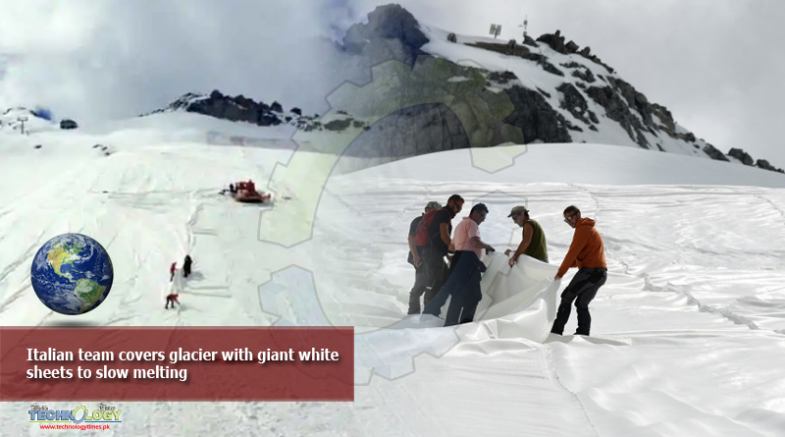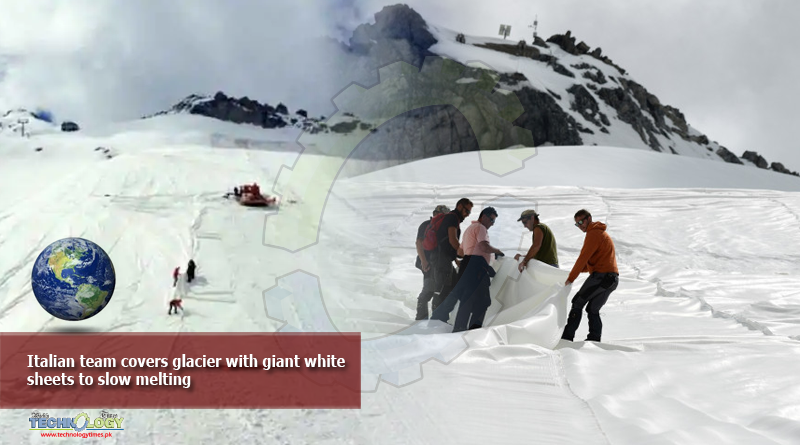Every summer, the Presena glacier in northern Italy is protected from the sun with huge reflective tarps.

A vast tarpaulin unravels, gathering speed as it bounces down the glacier over glinting snow. Summer is here and the alpine ice is being protected from global warming.
In northern Italy, the Presena glacier has lost more than one third of its volume since 1993.
Once the ski season is over and cable cars are berthed, conservationists race to try and stop it melting by using white tarps that block the sun’s rays.Terrawatch: glacial erosion creates higher mountainsRead more
“This area is continuously shrinking, so we cover as much of it as possible,” explains Davide Panizza, 34, who heads the Carosello-Tonale company that does the work.
From covering around 30,000 sq metres in 2008 when the project began, his team now places 100,000 sq metres under wraps.
Workers drag one of the sheets into position. Photograph: Miguel Medina/AFP/Getty Images
The coverings are “geotextile tarpaulins that reflect sunlight, maintaining a temperature lower than the external one, and thus preserving as much snow as possible,” he told AFP.
On the border between the Lombardy and Trentino Alto Adige regions, workers unroll the sheets in long strips, covering an area at an altitude of 2700-3000m.
They move methodically down the mountain under clear blue skies to pull the coverings taut, and sew them together to ensure warm drafts do not slip underneath. Bags of sand then act as anchors against the wind.Snow machines and fleece blankets: inside the ski industry’s battle with climate changeRead more
Once in place, the sheets, which measure 70m by 5m, are hardly distinguishable from the packed white snow beneath.
“There are glacier cover systems similar to ours on a few Austrian glaciers, but the surface covered by the tarpaulins is much smaller,” Panizza said.
The Austrian-made tarps cost up to €400 ($450) each and it takes the team six weeks to install them – and another six weeks to remove them before winter sets in again.
Franco Del Pero, 48, leads the operation and says technological improvements mean contemporary tarps protect better than earlier versions.
“When we remove them in September and we see that they did their job, we feel proud,” he says.
We’ve never had a better chance …
… to make a greener world. Covid-19 has delivered unusual environmental benefits: cleaner air, lower carbon emissions, a respite for wildlife. Now the big question is whether we can capitalise on this moment. The Guardian aims to lead the debate from the front.
In the weeks and months ahead, our journalism will investigate the prospects for a new green settlement. We will showcase the big thinkers and protagonists and amplify the arguments for authorities everywhere to consider as they lead us out of coronavirus.
Our credentials suit us well to the task: we are independent, we have no owners, no paymasters or oligarchs pulling the strings. We have committed to carbon neutrality by 2030, divested from the oil and gas sectors and renounced fossil fuel advertising. But at this crucial moment, news organisations like ours are facing a daunting financial challenge. As businesses everywhere feel the pinch, the advertising revenue that has long helped to sustain our work has plummeted. We need you to help fill the gap.
Our journalism is open to all because we believe everyone deserves access to factual information, regardless of where they live or what they can afford to pay. If you can afford to, we hope you will consider supporting our journalism today.
The Guardian believes that the climate crisis we face is systemic. We will inform our readers about threats to the environment based on scientific facts, not driven by commercial or political interests. We will keep reporting on the efforts of individuals and communities around the world who are fearlessly taking a stand for future generations and the preservation of human life on earth. We want their stories to inspire hope.
We need your support to keep delivering this kind of open, committed independent journalism. Every reader contribution, however big or small, is so valuable.
Originally Publish at: https://www.theguardian.com/
